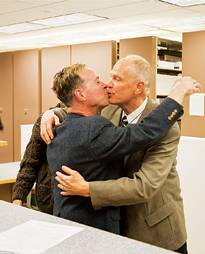Marriage equality in Iowa still a topic of debate

Mark Kassis and Terry Lowman, both of Ames, kiss after completing their marriage license on April 27, 2009 in the Story County Administration building in Nevada. Kassis and Lowman were the first same-sex couple married in Story County.
December 2, 2010
Since three of the Iowa Supreme Court justices were voted out this past election, marriage equality has become a topic of debate once again.
Chief Justice Marsha Ternus and Justices David Baker and Michael Streit were the three judges ousted in November after a campaign was launched against the judges led by Republican Bob Vander Plaats.
Iowa officially legalized same-sex marriage April 3, 2009, after nearly two years of debate. The original ruling occurred in August 2007, but the ruling would eventually have a stay put on it shortly after Judge Robert Hanson’s ruling.
“I don’t put much stock in these patchwork quilts of ‘one state here and there.’ We need a federal marriage equality law and a federal equal protection law,” said Warren Blumenfeld, assistant professor of curriculum and instruction. “We will not be safe until we have that federal legislation.”
Three years ago, Terry Lowman and Mark Kassis became the first same-sex couple to be legally married in Story County.
The two married Sept. 2, 2007, at the Unitarian Universalist Fellowship of Ames after being together for 30 years, but their wedding was rushed because of knowledge that the ruling could have a stay put on it.
The couple did successfully obtain a marriage certificate in Des Moines, but it was not finalized before the stay was put in place. After the Iowa Supreme Court ruling in 2009, the couple was able to finally formalize their wedding.
“We had about 49 hours to plan our wedding,” Lowman said.
In just 49 hours, Lowman and Kassis managed to get 230 guests to their wedding after the ruling.
“I didn’t think I’d ever live long enough to see it happen,” Lowman said about the Iowa Supreme Court’s ruling.
Brad Freihoefer, coordinator of Lesbian Gay Bisexual Transgender Student Services, has witnessed same-sex marriages in the past.
“It’s amazing. Sometimes not enough people see the love and the care and commitment folks are making,” Freihoefer said. “I think that’s a pretty beautiful thing.”
Although same-sex couples are legally able to get married in Iowa, the federal government still does not recognize them, Freihoefer pointed out.
He believes there is still a long way to go, but Iowa is certainly making progress.
Blumenfeld said there could soon be a revolutionary U.S. Supreme Court ruling that would legalize same-sex marriage throughout the country.
“The 14th amendment of the U.S. Constitution guarantees equality of treatment under the law,” Blumenfeld said. “That is the basis of what the Supreme Court justices in Iowa used to unanimously vote in favor of marriage for same-sex couples in Iowa. They used the equal protection clause in the Iowa State Constitution, which is identical to the one in the U.S. Constitution.”
While marriage equality in Iowa remains a hot-button issue, Iowa is one of only a handful of states in the U.S. to have legal, same-sex marriage.
“Some folks are going to decide to get married, some folks will not. To have the opportunity is really the big piece,” Freihoefer said.
He also said he hopes other states will soon have the opportunities that Iowans have.
“I used to be a Minnesotan and Wisconsinite, so my colleagues and friends there do not have the opportunities that Iowa does,” Freihoefer said. “That’s a big deal. I wish that they do, and I hope that they will soon.”
















